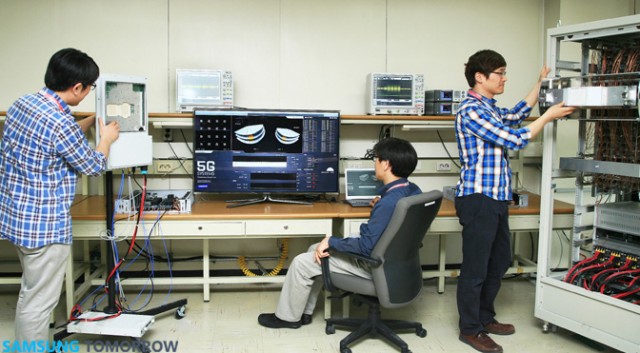
South Korea, eager to keep its title as the world’s most connected nation, has announced that it will spend $1.5 billion (1.6 trillion won) on rolling out a next-generation mobile 5G network. What actually constitutes a 5G network is a bit nebulous at the moment, but the general consensus is that it would be somewhere between 10 and 1000 times faster than current 4G LTE networks, with download speeds in the region of 100-1000 megabytes per second — fast enough to download a TV episode or movie in a couple of seconds. The South Korean government hopes that by getting ahead of the curve, national chaebols such as Samsung and LG — which represent a significant portion of the country’s entire GDP — will have a competitive edge when other nations get around to rolling out 5G.
What exactly is 5G? That’s a very good question, and as it stands there’s no definitive answer. The ITU, the organization that defines telecoms standards, has only just started looking at the problem and is years away from a 5G specification. Right now, 5G is essentially a catch-all term for the next generation of very-high-speed mobile networks that are being developed by various research groups around the world. There have been very few actual real-world 5G tests. In mid-2013, Samsung set up a “5G” wireless link capable of 1Gbps (100MB/sec) over two kilometers (1.2 miles) — but there are scant few details on how Samsung actually pulled it off, and even fewer details of whether the test was actually applicable to mobile applications (it sounds like Samsung used a big van full of batteries and antennae).
If things move quickly, we might have a 5G standard by 2015 or 2016. The South Korean roadmap, following the government’s $1.5 billion investment, wants to see a trial 5G deployment in 2017, and a commercial service by the end of 2020. The main barrier to developing a 5G standard, though, is finding a suitable way of pushing gigabits of data through the air without interfering with other wireless services and without burning through the battery.

Generally, as we’ve moved through the generations (1G, 2G, 3G, 4G), most of the speed boosts have come from utilizing larger swaths of bandwidth. LTE-Advanced, the fastest 4G spec out there, uses 100MHz of prime wireless spectrum (2G only used 200KHz by comparison). While we can rely on new MIMO and modulation tech to get us some of the way to 5G, we’re ultimately going to need more bandwidth — and, down in the cellular sweet spot (700-2100MHz) there just isn’t that much bandwidth available. As a result, 5G may have to use higher frequencies (30-90GHz) where there’s a lot more free space — but the millimeter wave frequencies have their own problems (they are very rapidly attenuated by obstacles) that will need to be worked around.
By spending $1.5 billion on the project, the South Korean government hopes that it can give Samsung and LG, which own a huge portion of the worldwide smartphone market, a competitive edge when 5G is eventually rolled out in Asia, Europe, and North America. The government also notes that it would like to boost the country’s telecom infrastructure equipment industry, which so far only has 4.4% of the global market (peanuts compared to Samsung’s 30% share of the global handset market). If South Korea can beat the rest of the world to 5G by a couple of years, there could be a huge payout for the country’s hardware companies.
----------
If you liked this article, please subscribe to our YouTube Channel for tech news, reviews and video tutorials. You can also find us on Twitter, Instagram and Facebook.




